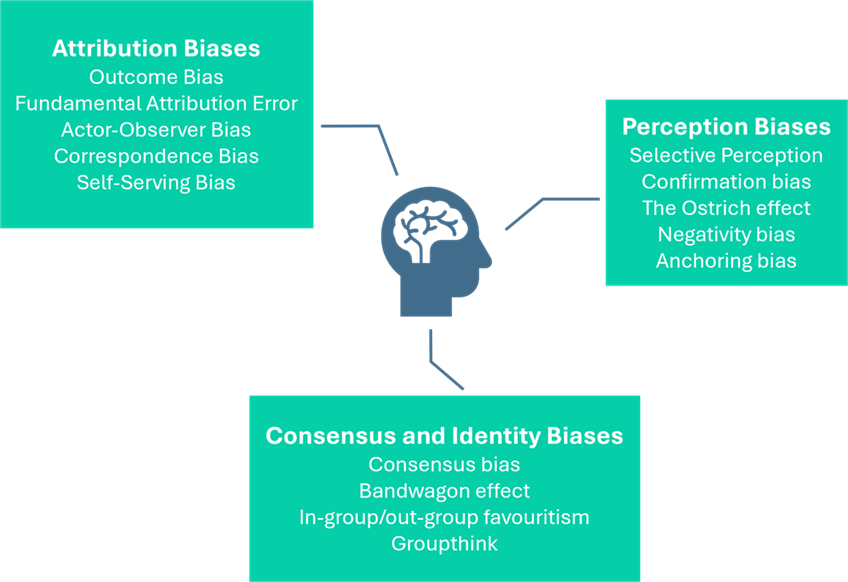Biases and tackling tough crowds

Ekrem Atamer, Lead Community Manager at Funcom, introduces the concept of cognitive biases as mental shortcuts that influence how people perceive the world, often leading to errors in judgment. Awareness of these biases broadens perspective and aids in better understanding community behaviour, peers, and oneself. This understanding is particularly useful in community management.
Types of cognitive biases relevant to community management
Attribution Biases

Ekrem categorizes biases for presentation clarity, beginning with attribution biases, where complex realities are simplified into internal or external reasons for success or failure. For example, "champions" or fans attribute positive outcomes internally (e.g., company innovation), while "jaded" individuals attribute success to external factors like luck. Conversely, failures are attributed internally by jaded individuals and externally by champions. This bias highlights how group affiliation shapes perception without necessarily dismissing any viewpoint outright.
Perception biases
The second category, Perceptual biases include selective perception, confirmation bias (favouring information that confirms existing beliefs), and the ostrich effect (avoiding contradictory information). These biases contribute to phenomena such as negativity bias, where negative information impacts more strongly and lasts longer, and anchoring bias, where first impressions form a reference point for future judgments. An example from Ekrem's experience involved a gaming community fixated on "fixing netcode," creating a persistent negative anchor that shaped all related conversations until communication strategy was adjusted.
Consensus and identity biases
The third category is Consensus and identity biases. Social dynamics include consensus bias (seeking agreement with others), bandwagon effect (following group behaviour), in-group/out-group favouritism, and groupthink (conformity for harmony). These biases often manifest in online communities such as Reddit and Discord, where tightly knit groups can become resistant to change and sometimes toxic. The size and nature of these groups influence how quickly these effects occur.
Managing community dynamics: challenges and strategies
Ensuring equal voice
Participants raised a conversation about how dominance by outspoken members should be addressed. Ekrem explains that while influencers are engaged differently, most community dynamics are allowed to evolve naturally. For consistent contributors, special engagement such as testing invitations is used, but the overall community voice is balanced without the need to interfere or level.
Handling negative or difficult members
Recognizing that community negativity may stem from various personal factors, including bad days or external stressors is hugely important. People primarily want to feel seen and heard. Even harsh criticism often reflects a desire for acknowledgment rather than rejection. Community managers must avoid dismissing emotional reactions as invalid.
For bad-faith actors, the strategy involves offering them a chance to engage constructively and then disengaging if negativity persists. Consistent enforcement of community rules, regardless of a member’s stance, builds credibility and fairness. Hardball questions should be addressed honestly, even if the answer is limited or unsatisfactory. Redirecting conversations with empathy helps maintain dialogue without dismissing concerns.
Communication and authenticity
Key principles for community engagement include active listening, honesty, kindness, empathy, and acknowledgment of all members. Honesty involves being transparent about what can and cannot be discussed. Authenticity is critical and increasingly valued, especially by younger generations who reject traditional corporate communication styles. Presence and genuine interaction help combat misinformation and build trust.
Bias awareness in community management
While awareness of biases does not eliminate them, it enables community managers to recognize and mitigate their effects. This awareness helps maintain groundedness and mental health when facing online negativity. The ultimate goal is to foster unison with the community, creating champions and positive engagement through respect and authenticity.
Broader applicability
The conversation between Ekrem, 3sides hosts and participants reflects on how gaming community management principles translate to other industries, emphasizing universal values like listening, honesty, and authentic feedback. The importance of encouraging diverse voices and managing group dynamics is recognized as a common challenge across community types. The evolving expectations around authenticity and communication style are significant trends.
Conclusion
This meetup underscores the complexity of managing online communities, the influence of cognitive and social biases, and the necessity of empathetic, honest communication to nurture positive and engaged user bases.








